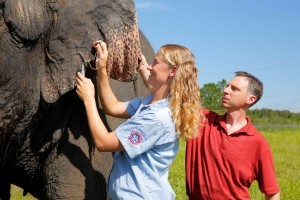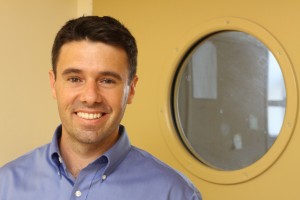Elephants genes against cancer
The research group headed by Prof. Avi Schroeder from the Technion has been chosen to lead a research study attempting to apply these findings to humans in the hopes of developing new cancer treatments

Dr. Joshua Schiffman of the University of Utah’s Huntsman Cancer Institute in Salt Lake City, Utah, with Dr. Ashley Settle, Director of Veterinary Care at Ringling Bros. Center for Elephant Conservation, performing blood tests.
Photo Credit: Feld Entertainment, The University of Utah Health Sciences Center
Prof. Avi Schroeder from the Faculty of Chemical Engineering at the Technion to head pioneering research in cancer treatment, based on the findings of a study led by Dr. Joshua Schiffman of the University of Utah’s Huntsman Cancer Institute in Salt Lake City, Utah. Dr. Schiffman’s paper was published on October 8 in the Journal of the American Medical Association.
Dr. Schiffman and his colleagues studied cancer resistance in elephants. Although the number of cells in the body of an elephant is infinitely greater than the number of cells in a human body, cancer rates found among the elephant population stands at less than 5% as compared with 25% in humans.
Dr. Schiffman and his colleagues identified the most plausible explanation of this phenomenon: the prevalence of a cancer-preventing gene that encodes the protein p53 – elephants harbor roughly 20 copies of the gene in their genome while humans sport only two copies of the p53 gene. “Right now we are focusing on discovering new ways of applying these findings to children and families at high risk for developing cancer,” explains Dr. Schiffman. “We intend to leverage this knowledge derived from nature for the prevention, early diagnosis and treatment of cancer in humans – in order to translate research from bench-to-bedside.”
This is where Prof. Schroeder’s research group from the Technion comes in. Prof. Avi Schroeder, who completed his postdoctoral studies with Prof. Bob Langer at the Massachusetts Institute of Technology (MIT), is developing nanotechnology vehicles that target medicines to diseased tissues within the body, while avoiding healthy ones. “Secondary tumors – or metastatic cancer – are the biggest challenge in fighting tumors,” explains Professor Schroeder. “This is due to the fact that these tumors are small, unpredictable and highly scattered, and attack a patient when their immune system is weak from fighting the primary tumor. The nanoscale vehicles we are developing are capable of locating the diseased tissue and releasing the drugs it is carrying directly at the targeted area.” Now Prof.

Prof. Avi Schroeder from Technion’s Faculty of Chemical Engineering.
Photo Credit: Technion Spokesperson’s Office
Schroeder and his research group will attempt to harness the technology to deliver the p53 gene at its varied forms to cancerous tumors in the human body. Schroeder believes this may be the brink of a revolutionary approach where insights from the animal world contribute to the treatment of human diseases.
Dr. Schiffman said that he welcomes the expanded collaboration with his Technion colleagues and is excited about the research initiative. “Prof. Schroeder is an excellent collaborator who has agreed to help us translate our findings for the benefit of cancer patients. As part of the collaboration between the University of Utah and the Technion we will learn how to implement 55 million years of elephant evolution for high risk cancer patients.”
Prof. Schroeder and his colleagues from the Northern United States raised more than one million dollars for this future study from major American organizations.


